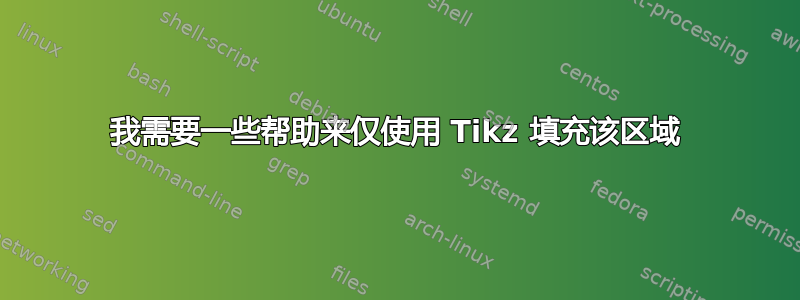
我怎样才能仅使用 tikz 包来填充红色条纹区域。这是我迄今为止所做的:
\begin{tikzpicture}[>=stealth]
\draw[pattern=horizontal lines dark gray ,opacity=0.4,domain=-57*pi:0 ,variable=\t , draw=none]
plot ({cos(\t)},{sin(\t)}) % Filling the semi-circle
\draw[->,line width=0.5mm] (-2.5,0)--(0,0)node[below left]{\footnotesize{$O$}}--(2.5,0)node[below]{$x$} % horizontal axis
\draw[->,line width=0.5mm] (0,-2)--(0,4)node[right]{$y$}; % Vertical axis
\draw [samples=100,smooth,domain=-57.5*pi:0,variable=\t, line width=0.5mm] plot ({cos(\t)},{sin(\t)}) %plot the semi-circle
\draw[black,line width=0.5mm, dashed] (1,0) -- (1,1.4142)
\draw[black,line width=0.5mm, dashed] (0,1.4142) -- (1,1.4142)
\draw [samples=100,smooth,domain=-21.5*pi:21.5*pi,variable=\t, line width=0.5mm]
plot ({tan(\t)},{1/cos(\t)}) % Plot graph y^2-x^2=1
\draw[pattern=horizontal lines dark gray ,opacity=0.4,domain=0:15 ,variable=\t , draw=none]
plot ({tan(\t)},{1/cos(\t)}) % Trying to fill the bottom (0,1)
\end{tikzpicture}
答案1
或者你可能想尝试元帖子...
这已被包裹起来,luamplib因此您可以使用它来编译它lualatex。
\documentclass[border=5mm]{standalone}
\usepackage{luamplib}
\begin{document}
\mplibtextextlabel{enable}
\begin{mplibcode}
beginfig(1);
% unit length
numeric u; u = 1cm;
% axes
path xx, yy;
xx = (3 left -- 3 right) scaled u;
yy = (3 down -- 5 up) scaled u;
% curves
path parabola, semicircle;
vardef f(expr x) = sqrt(1+x**2) enddef;
parabola = ((-3, f(-3)) for x=1/8 - 3 step 1/8 until 3: -- (x, f(x)) endfor) scaled u;
semicircle = halfcircle rotated 180 scaled 2u;
% find the upper part of the area to fill
path filler;
filler = buildcycle(yy, xx, yy shifted point infinity of semicircle, parabola);
color pink, grey;
pink = 3/4 [red, white];
grey = 7/8 white;
% fill in three parts to fake transparency
fill filler withcolor pink;
fill origin -- subpath (0, 2) of semicircle -- cycle withcolor grey;
fill origin -- subpath (2, 4) of semicircle -- cycle withcolor 5/8[pink, grey];
% use this commented out loop to find which point is which on the filler
% for i=1 upto length filler: dotlabel.rt(decimal i, point i of filler); endfor
% draw the dashed line
draw subpath (4, 5) of filler -- (0, ypart point 5 of filler) dashed evenly scaled 1/2;
% remaining lines and labels
drawarrow xx;
drawarrow yy;
draw parabola;
draw semicircle;
label.top("$y$", point 1 of yy);
label.rt("$x$", point 1 of xx);
label.llft("$O$", origin);
endfig;
\end{mplibcode}
\end{document}
用图案填充区域稍微复杂一些,但只是稍微复杂一点。您可以使用hatching宏或者自己通过剪辑变量来做picture:
\documentclass[border=5mm]{standalone}
\usepackage{luamplib}
\begin{document}
\mplibtextextlabel{enable}
\begin{mplibcode}
beginfig(1);
% unit length
numeric u; u = 1cm;
% axes
path xx, yy;
xx = (3 left -- 3 right) scaled u;
yy = (3 down -- 5 up) scaled u;
% curves
path parabola, semicircle;
vardef f(expr x) = sqrt(1+x**2) enddef;
parabola = ((-3, f(-3)) for x=1/8 - 3 step 1/8 until 3: -- (x, f(x)) endfor) scaled u;
semicircle = halfcircle rotated 180 scaled 2u;
% make the semicircle grey
fill semicircle -- cycle withcolor 3/4 white;
% find the area to fill
path filler;
filler = buildcycle(yy, semicircle, yy shifted point infinity of semicircle, parabola);
picture stripes;
stripes = image(
for i=-10 upto 10:
draw (left--right) scaled 100 rotated 42 shifted (0, 5i)
withpen pencircle scaled 3/4
withcolor 2/3 red;
endfor
);
clip stripes to filler;
draw stripes;
% draw the dashed line
draw subpath (5, 6) of filler -- (0, ypart point 6 of filler) dashed evenly scaled 1/2;
% remaining lines and labels
drawarrow xx;
drawarrow yy;
draw parabola;
draw semicircle;
label.top("$y$", point 1 of yy);
label.rt("$x$", point 1 of xx);
label.llft("$O$", origin);
endfig;
\end{mplibcode}
\end{document}
答案2
在等待 TikZ 答复时......
只是为了好玩(chỉ cho vui thôi)和 Asymptote 一起。
import graph;
size(200,false);
pair f(real t){
real x=cos(t);
real y=sin(t);
return (x,y);
}
pair g(real t){
real x=tan(t);
real y=1/cos(t);
return (x,y);
}
path F=graph(f,-pi,0,300),G=graph(g,-1,1);
fill(F--cycle,gray);
path a,b;
a=subpath(G,times(G,1)[0],times(G,0)[0]);
b=subpath(F,length(F)/2,length(F));
fill(a..g(atan(0))--relpoint(b,0)..b..relpoint(b,1)--g(atan(1))--cycle,red+opacity(.9));
draw(F,green);
draw(G);
draw((1,0)--(1,sqrt(2))--(0,sqrt(2)),dashed);
label("$O$",(0,0),dir(-135));
limits((-1.5,-1.5),(1.5,1.5));
xaxis("$x$",Arrow,above=true);
yaxis("$y$",Arrow,above=true);
shipout(bbox(2mm,invisible));
或者
...
b=subpath(F,length(F)/2,length(F));
picture pic;
fill(pic,a..b--cycle,red+opacity(.9));
clip(pic,(0,-1.5)--(0,1.5)--(1,1.5)--(1,-1.5)--cycle);
add(pic);
draw(F,green);
...






